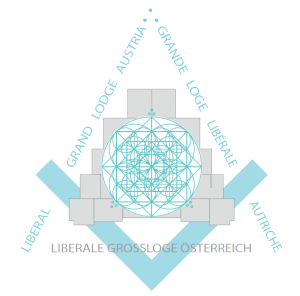 History of the Liberal Grand Lodge
History of the Liberal Grand Lodge
The origins of the LGÖ are in the early 1950’s, as a group of Bretheren left the Grand Lodge of Austria because they could not accept a decree handed down to Austria by the Grand Lodge of England regarding the (non-)recognition of Lodges not expressly authorised by the Grand Lodge of England, even though those lodges strictly followed Masonic tenets.
From 1953 on they held meetings ‘under the free heavens’, ie., informally, and started work on a completely new formal framework for Masonry as they understood it.
On Sept. 24, 1955, they formally founded the lodge ‘UFML’ – Independent Freemasons Lodge of Vienna – which was one of the founding lodges of the international union of liberal freemasonry ‘CLIPSAS‘ (Centre de Liaison et d’Information des Puissances maçonniques Signataires de l’Appel de Strasbourg) in 1960.
The tenets of the UFML embrace the ‘Old Charges‘ according to Rev. Anderson, and include ‘New Charges’ as a completion thereof. These tenets were codified in 1974, and are not only valid today, but enjoy growing international acceptance. The text represents an attempt to rekindle the light of rationalism in a world full of paradox, inhumanity and indifference.
From the beginning, alternating with the fortnightly Lodge meetings, the Bretheren held so-called conference meetings, open to non-masons. The idea behind the conference meetings was to prevent an ‘Ivory tower’ of masonry far apart from everyday trends and problems. In 1973 the conference was transformed into an apolitical, humanitarian club, serving as a introductory organisation for masonry, also giving the opportunity for masons to hear interesting talks from non-masons. Starting in 1978, women were also invited to the conference meetings.
A discussion lasting several years within the (purely masculine) UFML to the question: should they really implement the liberal tenets, and accept women as masons; came to a positive conclusion, and made possible.
In early 1985, the group was strong enough to found a Grand Orient. Light was brought to “Zu den Neuen Pflichten” on the 8th May, “Gotthold Ephraim” followed on June 26th. On that same day the three lodges founded the Grand Orient of Austria.
At long last, on November 27th 1985, six women were initiated into the two new lodges; the UFML remained a purely masculine lodge (it did accept ladies as guests) until 2004.
In September 2003 all three founder lodges declared their withdrawal from the Grand Orient. UFML, Zu den Neuen Pflichten and Gotthold Ephraim keep, however, the masonic ideals, and flourished as free lodges, working close together in shared premises, and founded on St. Johns day, June 24th 2007, the Liberal Grand Lodge of Austria.
Thus is shown that, in Austria, there are lodges and a grand lodge that combine traditional masonic culture with modern democratic coexistence and responsible independence.
In October 2007, the Liberal Grand Lodge of Austria applied for acceptance in the CLIPSAS, itself founded in 1961 by the mother lodge UFML.
On July 14th, 2008, the Liberal Grand Lodge, together with other Obediences, founded the AACEE with the aim of furthering the development of masonry, particularily the young lodges and obediences in central and eastern Europe.
Since May 21st, 2011, the Liberal Grand Lodge of Austria is member of Clipsas.